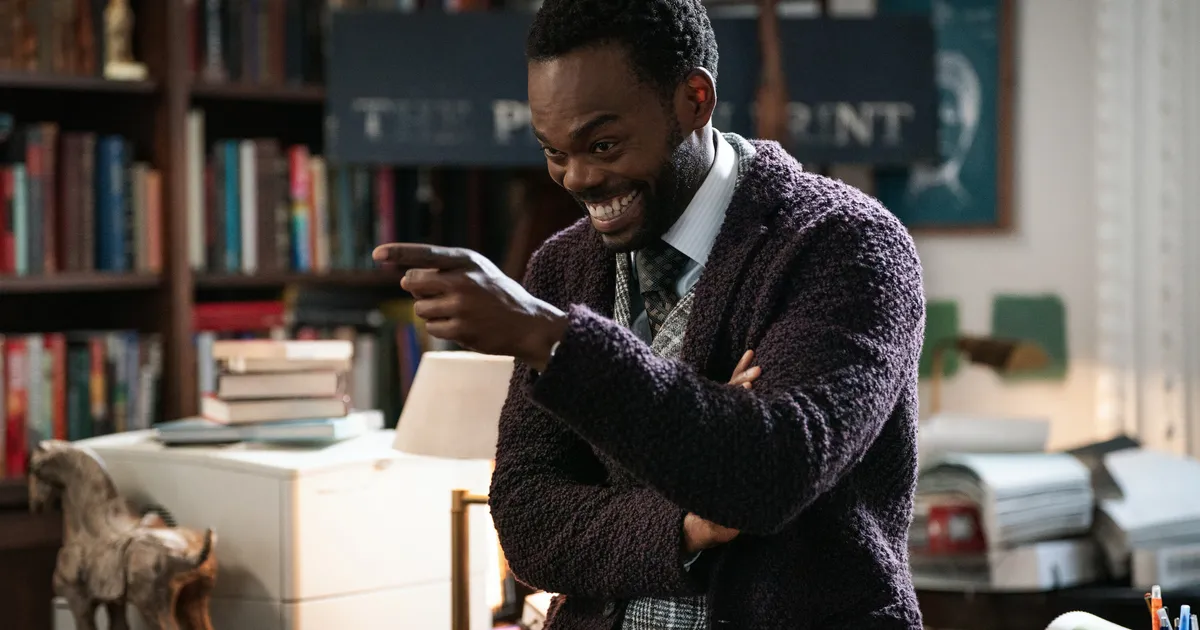Copyright Vulture

Where is the dividing line between authenticity and scammer behavior? It seems like it should be a stark one, but “Poetic Justice” argues for something fuzzier. Is Alec Bloom’s seemingly sincere political schmoozing meaningfully different from arts nonprofit director Gary Pidgeon debasing himself to coax money from donors? Does it matter if Detective Rivers is in earnest or being phony when he parrots talking points from HR training about women in the workplace, when it leads to a better working relationship with Elsbeth? Will his and Elsbeth’s little confession-yielding deception of their own at Gary’s dry cleaner hold up in court? When Elsbeth meets Alec (Ivan Hernandez) at a benefit (on the courtly arm of Dr. Yablonski, who has now popped up in each of Elsbeth’s three seasons to date), the aspiring mayoral candidate comes across as a Zohran Mamdani-inflected unifier. He’s running on an affordability platform, was homeless as a kid, was a fire marshal before getting into politics, and has a smile, an anecdote, and a handshake for everyone. Elsbeth is impressed and wary. On the one hand, they seem to share a genuine love of New York, even the cheesy touristy stuff like the hip-hop bus tour and the restaurant where the waitstaff sing show tunes. They even sing the opening lines of “Manhattan” together! On the other hand, she’s right to ask, “How do I know you’re not being Clintonian?” Is Alec’s folksiness sincere or cynical? With Marissa Gold (Sarah Steele) as his campaign manager, it could be a bit of both. After her stints working for Alicia Florrick and Diane Lockhart, she’s moved to New York. Elsbeth is glad to see a friend from the old days, and is encouraged to hear that Marissa isn’t like her famously opportunistic dad, Eli, or at least, she doesn’t want to be that kind of person. By the episode’s end, though, it’s clear that Marissa’s mostly virtuous self-image was more aspirational than practical, which was pretty easy to see coming. Regardless of whether or not Elsbeth can forgive her for leaking the photos that led to the New York Post View dubbing Elsbeth Alec’s “mystery redhead”, we’ll be seeing Marissa again. You’re not going to declare that “the future of New York City is in [Elsbeth’s] hands!” and peace out for the rest of the season. Of course, Elsbeth has her hands full, what with Dr. Yablonski’s regret-tinged reminiscences about the late literary nonprofit donor and poet Dolores Feinn (Lois Smith). She’d died in a freak apartment fire when her cigarette ignited the oxygen-rich air in her writing nook the previous week, and Dr. Yablonski (Daniel Davis) feels bad that he’d always thought her portable oxygen tank was a prop she’d used as part of a harmless scam to get the best tables at restaurants around town. The pressure gauge never went below full, after all, and she was in her 90s; a gal’s got to have a hobby and some fun! There’s something not quite right with the details as Dr. Yablonski understands them, and even if we did not already know that his friend Gary (William Jackson Harper) was the one who loosened the valve on Dolores’s oxygen tank, we might be narrowing our eyes suspiciously at him, anyway. All those mournful words about the loss of such a great talent keep tumbling out of his mouth as if he just can’t wait to bask in the glow of Dolores’s memory, and it just sounds, oh, what’s the word? Ah, yes: it sounds like bullshit. Now, as we learn from “Nipples of the Sea,” one of Dolores’s unpublished works (submitted to rival literary magazine Tumbleweed), BOTH THINGS CAN BE TRUE. Gary can be a little bit sad that Dolores is dead and be thrilled to the marrow that he managed to do away with the rich old bat before she had an opportunity to update her will and reduce her bequest to his struggling literary journal, Pigeon Print. Still, the whole story — minus Dr. Yablonski’s suspicion about Dolores’s victimless restaurant table scam — just doesn’t sound right to Elsbeth, so she gets Captain Wagner’s approval to re-investigate. The only problem here is getting paired up once again with the whiny Detective Rivers, but he’s behaving way better than usual, taking Elsbeth’s opinion seriously and hearing her out. They wind up collaborating reasonably well across their case work and he’s game to be her cameraman as she gets Gary to confess to Dolores’s murder. Rivers definitely wants to stay on Wagner’s good side now that he’s dating Julia, and he also surely wants to avoid any HR issues, so maybe his stilted declarations of respect aren’t heartfelt, but Elsbeth doesn’t mind, and they get their man as a result. Workplace harmony and effectiveness easily win over sincerity in this case. Elsbeth’s confession-prompting trickery is a combo pack of her patented cheerful questioning style over several friendly interrogations and a masterful fakeout featuring assists from Alec, the former fire marshal, Steve, the doorman (Jim C. Ferris), and May, the dry cleaner (Rika Akanishi). Gary’s eventual crumbling in the face of Elsbeth’s very authoritative-sounding revelation about the bleaching powers of high oxygen concentration is so inevitable that I almost feel bad for him. Special shout-out to Harper’s performance, which strikes me as a restrained cousin to John Cleese’s turn as Basil Fawlty in Fawlty Towers. Murder aside, Gary is better behaved than Basil overall, of course; the aspect of Cleese’s performance that Harper nails so beautifully is Gary’s increasing sense that the walls are closing in, and despite what he considers his rather brilliant efforts, his situation is growing more untenable by the minute, because he is surrounded by infuriating people. Gary’s desperation throughout the episode is understandable. As seemingly every character in this episode says, the arts are under attack. Gary’s rival at Tumbleweed, Fred (Arnie Burton), notes glumly that nobody is buying books (tell that to my To Be Read shelves), and potential donors aren’t as generous as they were in the past. Gary himself keeps hitting brick wall after brick wall in his donor cultivation efforts — it’s not just Dolores’s supposed $200 million being held ransom, either (she won’t pinky swear on the bequest unless Gary agrees to publish an annotated version of her unreadable-sounding epic poem, “Quest For Eternal Spring, Or: The Blood Circus”). His associate director, Hannah (Megan Haley), is the daughter of very successful dental floss magnates but refuses to ask them to contribute. How is Gary supposed to fulfill his obligation to keep the press going if prospective donors won’t donate?! It’s just too bad for Gary that the outcome he expected from doing a soul-destroying murder doesn’t come to pass. Getting outwitted by a crabby, supposedly rich little old lady of incredibly modest literary gifts has got to sting, and the one-two of being bequeathed her unpublished (for good reason!) poetry and a whopping $413.17, less accounting fees, must feel like a gallon of lemon juice dumped on full-body paper cuts. Dolores living in a $250/month rent-controlled apartment and sustaining herself with the years-long grift of insisting on being wined and dined by administrators of arts nonprofits is a thing of beauty. Good for you, and rest in peace, queen of scams! I keep thinking about what goes down between Elsbeth and Marissa back at the precinct; it’s one thing for Marissa to confess to being the source of the whole “mystery redhead” story, but to ask Elsbeth not to “make any moves or tell anyone about this unless” Marissa herself tells her to is a whole lot more of a thing. What have you gotten our heroine and that nice Alec Bloom into, Marissa?! From The Tote Bags! We have so! many! literary and other cultural allusions in this episode; I’m including just a handful here, but you should feel free to offer up your favorites in the comments. • First up: poets, poets everywhere! I imagine Dolores’s work is meant to remind viewers of the work of other, better poets, but I’m not well-read enough to be sure who those writers are. Elizabeth Bishop, Sylvia Plath, John Keats, and Jorie Graham all receive admiring mentions in this episode, so I’ve linked to their bio pages at the Poetry Foundation, where you can also read selections of their work. I’ll also throw in a recommendation for the beautiful, devastating film Bright Star, about Keats and Fanny Brawne. • Elsbeth and Alec’s brief sing-along of Rodgers and Hart’s “Manhattan” urges me to encourage one and all to watch Blue Moon, Richard Linklater’s lovely new film about Lorenz Hart (and art, and love, and beauty, and the heartbreak of a dying creative partnership — but with jokes as well as tears!).



